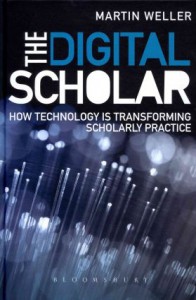This week in the free online course
#change MOOC, the focus was around Digital Scholarship. Based around the work of Martin Weller (who facilitated the session) and his book
The Digital Scholar (which is currently available open-source on the publisher’s website), the focus was around some of the changes technology is bringing to higher education and scholarship. As my research has been in the area of
networked learning and online identity development in higher education and doctoral studies, this is a fitting place for me to delve into this online course content.
In this context, Chap 5 of the text makes an interesting claim that is somewhat applicable for my own doctoral research:
There is a general suspicion around using social networks to share findings, although many researchers use them for personal and professional networking (James 2009; Carpenter 2010). Carpenter et al. describe researchers as ‘risk averse’ and ‘behind the curve in using digital technology’. Similarly Harley et al. (2010) state that ‘we found no evidence to suggest that “tech-savvy” young graduate students, postdoctoral scholars, or assistant professors are bucking traditional publishing practices’.
I use social networks for both personal and professional networking (though I still do not like the term networking, as I often consider it rather one-sided–people network to get, and not to give or share or collaborate), and I also find such networks fundamental to identifying and accessing research participants themselves. On top of that, I even use these technologies (especially through my Twitter account) to help myself think through and initiate research projects. The most valuable of these online communities I have found for my doctoral research is the Twitter-based #phdchat, what has become the hub of my online presence for personal and digital scholarship, support, and friendship.
As an early career researcher myself, I find the related JISC-funded The Lives and Technologies of Early Career Researchers. As the study (pg. 1) found:
Despite many ECRs being interested in trying out new technologies, 72% of early career researchers reported that they did not even use Web 2.0 or social media to share their research. This may reflect the many and varied constraints which limit ICT take-up amongst early career researchers, perhaps including norms of secrecy in research practice; this study found social, confidence, skills, institutional and participatory constraints on technology use by ECRs.
This gets me thinking–I use these technologies to think through and clarify my research direction, along with access partipants and then get feedback on the process and my research design. I do not ordinarily share results online. I wonder if this is due to the great gap in time between those first steps and the findings, or perhaps because, here in my doctoral work, I do not yet have findings to share? Only time (and more discussion, perhaps) will tell.

